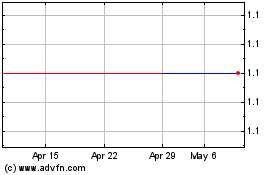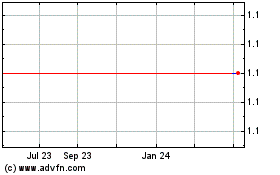Gazprom, EU Near Antitrust Case Settlement
October 26 2016 - 2:10PM
Dow Jones News
BRUSSELS—Russia's PAO Gazprom and the European Union's
competition watchdog said Wednesday they are close to settling a
longstanding antitrust case against the state-controlled energy
company.
If successful, a settlement would conclude one of the EU's most
politically sensitive competition cases that has been complicated
by the growing tensions between Moscow and Brussels over the
conflict in Ukraine and Russia's bombing campaign in Syria.
"We are now putting the final touch to our commitment proposal.
It will be sent to the European Commission shortly," Alexander
Medvedev, Gazprom's deputy chairman, said following a meeting with
the EU's competition commissioner, Margrethe Vestager. A person
familiar with the negotiations said that nailing down the
outstanding details for a preliminary settlement agreement might
still take "a couple of weeks."
Ms. Vestager said that she and Mr. Medvedev had discussed
concrete steps through which Gazprom could address the EU's
concerns, such as allowing customers to resell gas to other
countries and putting prices in Central and Eastern European gas
markets in line with those charged elsewhere.
"It is now for Gazprom to formally submit commitments that meet
the commission's objectives," Ms. Vestager said, adding that the
talks might still fail.
If the commission finds Gazprom guilty of breaking the EU's
competition rules it could impose fines of up to 10% of the
company's annual revenue.
The commission started investigating Gazprom's business
practices in 2011 amid suspicions that the company was abusing its
dominant position in several countries that were almost entirely
dependent on Russian gas. The two sides came close to settling the
case in 2014, but talks were abandoned following Russia's invasion
of the Ukrainian peninsula of Crimea and its backing for
separatists in Ukraine's east.
In spring 2015, Ms. Vestager formally charged Gazprom, alleging
the company breached antitrust rules in eight countries where it is
the dominant gas supplier—Bulgaria, Czech Republic, Estonia,
Hungary, Latvia, Lithuania, Poland and Slovakia.
Gazprom, which has rejected the commission's charges, has
insisted that the EU's antitrust rules don't apply to it as a
state-controlled company.
The commission said restrictive terms in Gazprom contracts
forced territorial constraints on customers, for instance by
prohibiting them from re-exporting gas to another country, and that
its practice of tying gas prices to the price of oil had led to
unfair charges in several markets.
It also said that Gazprom had tied the conditions under which it
sold gas to certain countries to their support for infrastructure
projects, such as pipelines.
Once the commission and Gazprom have agreed on a preliminary
settlement, the terms would be sent out for feedback from
competitors as well as the countries at the center of the case.
"The commission would of course carefully analyse all feedback
received," Ms. Vestager said. If Gazprom's commitments were found
to be sufficient, they would become legally binding for the
company.
Write to Gabriele Steinhauser at
gabriele.steinhauser@wsj.com
(END) Dow Jones Newswires
October 26, 2016 13:55 ET (17:55 GMT)
Copyright (c) 2016 Dow Jones & Company, Inc.
PJSC Gazprom (PK) (USOTC:OGZPY)
Historical Stock Chart
From Mar 2024 to Apr 2024

PJSC Gazprom (PK) (USOTC:OGZPY)
Historical Stock Chart
From Apr 2023 to Apr 2024
